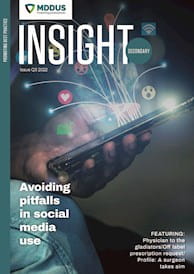
SOCIAL media offers many potential benefits for doctors, including networking and keeping up to date with current relevant health issues. However, it is not without some perceived downsides, including potential negative feedback or comments.
People may express dissatisfaction about service provision, posting either directly onto the social media page of a hospital or clinic, or on their own personal pages. They may also post negative reviews on web-based directories, such as Google reviews, or even official NHS patient resources.
Unfavourable online reviews have become particularly prevalent over the pandemic. Despite restrictions easing and departments doing all they can to meet patient demand, many doctors and the organisations they work for are subject to ongoing negative comments and even online abuse.
Common complaints include lengthy delays in being seen or invited for an appointment, fewer face-to-face appointments and increased use of remote consultations for some specialities.
Regardless of the reason behind such comments, the doctors or hospital staff identified in such posts can be left feeling helpless and unsure of how to respond.
Take time and reflect
Doctors may not even be aware of an adverse post until it is brought to their attention by their employer or a staff member, or the individual who made the comment, now wondering why there has been no response. It’s natural to feel upset or defensive about negative online feedback, and the knee-jerk reaction may be to reply immediately to the post to set the record straight.
However, it is best to take time and reflect. Choosing to reply directly to negative feedback or comments from your own personal social media page risks your own privacy and could potentially invite unwanted attention from patients now they have identified your personal profile.
Embracing feedback
It may also be tempting for organisations to simply switch off the ability for patients or followers to make comments or leave reviews on their social media page, but this could give the impression that feedback isn’t welcome. Organisations could advertise more productive ways to leave feedback, for example a contact email address for feedback. Remember that patient feedback, even if negative, can be viewed as an opportunity to learn and make positive changes where indicated.
When organisations proactively encourage feedback they often find that positive comments outweigh negative ones. In 2013, the NHS launched the Friends and Family Test (FFT) to help service providers and commissioners in England understand whether patients are happy with the service provided, or where improvements are needed. Patients are asked to provide feedback and organisations are encouraged to submit these comments on a monthly basis to NHS England. Millions of patients have completed the Friends and Family Test and around nine out of 10 comments are positive.
Collecting feedback in this way may deter patients going online to post feedback publicly, leaving you wondering what to do next and whether or not to post a response.
Practical advice
MDDUS often receives calls from members seeking advice on how to deal with adverse comments online. Before deciding how to respond, doctors must consider the particular circumstances.
No response
If you feel that posting a reply will only make matters worse or spark a wider debate, it might be better to note the comments and leave well alone. A critical comment of you or the hospital might also be considered fair and legitimate and that should trigger reflection and possibly a debrief involving the wider team. It takes resolve to handle criticism in this way but it should be recognised that in some situations, responding defensively will only make matters worse and cause more issues longer term.
Replying to the original post or comment
This may be the preferred option for hospitals responding to comments on their own social media profile and there may be a department within their communications team who can manage this. Our advice here would be to limit any response to a simple acknowledgement of the concern, providing a link to the health provider's complaints policy.
An example of this type of response might be: “We are sorry to hear you have had a poor experience and I would like to suggest that you contact us to discuss how we may resolve this matter for you.”
Responding in this way may help the individual feel their feedback is valued and that the hospital is prepared to take it seriously. It may also prevent more abusive comments being posted, by demonstrating that the organisation views and responds to patient feedback professionally.
Dealing with online abuse or threats
Comments or feedback that are abusive or threatening are upsetting to read and should be addressed as soon as possible: either removing the post with an explanation of why (if there is an ability to do so) or contacting the relevant platform to request that the post be removed. In extreme circumstances, consider contacting the police to report serious abuse or threats.
Some posts may be anonymous, but if you can identify the individual it may be appropriate to take action in line with your health provider’s ‘zero tolerance’ policy.
Regulatory guidance
The GMC has specific guidance regarding social media and reminds doctors that:
When using social media:
36. You must treat colleagues fairly and with respect.
65. You must make sure that your conduct justifies your patients’ trust in you and the public’s trust in the profession.
69. When communicating publicly, including speaking to or writing in the media, you must maintain patient confidentiality. You should remember when using social media that communications intended for friends or family may become more widely available.
70. When advertising your services, you must make sure the information you publish is factual and can be checked, and does not exploit patients’ vulnerability or lack of medical knowledge.
They also have created an area within their ethical hub that provides further practical advice for doctors when using social media and offers guidance doctors should consider in their wider use of social media.
Professional or casual online forums
Another area of social media requiring some caution is online engagement with other healthcare professionals. This may involve sharing ideas and views for educational purposes or for mutual support. Sometimes individuals may share personal views on colleagues or other healthcare providers that are not always professional.
Unfair criticism on such sites can leave some professionals feeling bullied or targeted by their peers.
Should you feel it necessary to raise concerns about the conduct of another medical professional, social media is not the place to do this. There are specific steps to take as set out in GMC guidance on raising concerns.
Organisational policy
Check what your organisation's policy is on social media use and whether there is specific guidance on how to deal with negative comments or abuse. This will help staff understand their responsibilities in regard to their own personal online presence.
In this online, connected world we now live in, it is inevitable that patients or those close to them will air their views and experiences of personal healthcare. Online criticism may be unfair or not – but it is important to be aware of the options on how to respond.
Follow the regulatory guidance to ensure expected standards are maintained, and if in doubt, do not hesitate to contact MDDUS for advice.
Kay Louise Grant, risk adviser, MDDUS
This page was correct at the time of publication. Any guidance is intended as general guidance for members only. If you are a member and need specific advice relating to your own circumstances, please contact one of our advisers.
Read more from this issue of Insight Secondary

Save this article
Save this article to a list of favourite articles which members can access in their account.
Save to library

